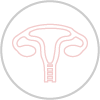The pelvis is made up of a number of bones forming two main joints – the sacroiliac joints (SIJ) at the back, and the pubic symphysis joint at the front. PGP is the term used to describe the pain experienced in the front and back of your pelvis and 1 in 5 women experience some degree of pelvic girdle pain in pregnancy. The joints of the pelvis are held together by thick ligaments and ordinarily these ligaments give the joints stability by allowing only small movements.
A number of changes during pregnancy may cause pain in the pelvic girdle, including hormones, altered posture, the growing baby, or trauma. Hormonal changes (most commonly the hormone Relaxin) during pregnancy causes a softening and subsequent laxity of the ligaments, potentially causing increased mobility of the joints. This relaxation of the ligaments and joints is essential to prepare the pelvis for delivery of your baby, but can often have unwanted effects too. The joints can move asymmetrically and unevenly, causing pain. Muscles of the pelvis, lower back and legs attempt to compensate for this increased movement, and often develop tightness and pain. Some muscles such as your abdominals and pelvic floor, may also be weakened and become inhibited, thus causing altered function. Previous trauma that has damaged the pelvis, or a fall, before or during pregnancy can also make you more at risk of developing PGP. Occasionally the position of the baby may attribute to PGP symptoms.
Symptoms of PGP:
- Pain when standing on one leg (e.g. dressing, climbing stairs, walking)
- Pain and difficulty moving your legs apart (e.g. getting in and out of the car or bath)
- Pain on turning in bed, and difficulty lying in some positions
- Difficulty walking
- Pain with twisting movements (e.g. pushing a trolly, pram or hoovering)
- Clicking or grinding in the pelvic area
There is a wide range of symptoms, and in some women it can be much worse than in others. Having some symptoms does not mean you are automatically going to get worse. If you get the right advice and treatment during early pregnancy, or as soon as it’s identified, it can usually be managed very well. A range of options are available to you, depending on the type of PGP you have, so don’t delay in seeking help and assessment.
Physiotherapy for PGP:
- Full assessment of the pelvic girdle, spine, hips, legs, ligaments and muscles
- Postural assessment and correction
- Teaching effective positioning for sitting, standing, lying, walking
- Manual therapy as indicated (gentle joint mobilisations, soft tissue massage, fascial release and stretching)
- Discussion of lifestyle and factors influencing pain – work, daily activites, hobbies, household chores
- Teaching specific exercises for spinal and pelvic stability, stretching and pilates
- Provision of maternity belts and/or walking aids
- Pain management and therapeutic options
- Discussion of labour and birth plan



